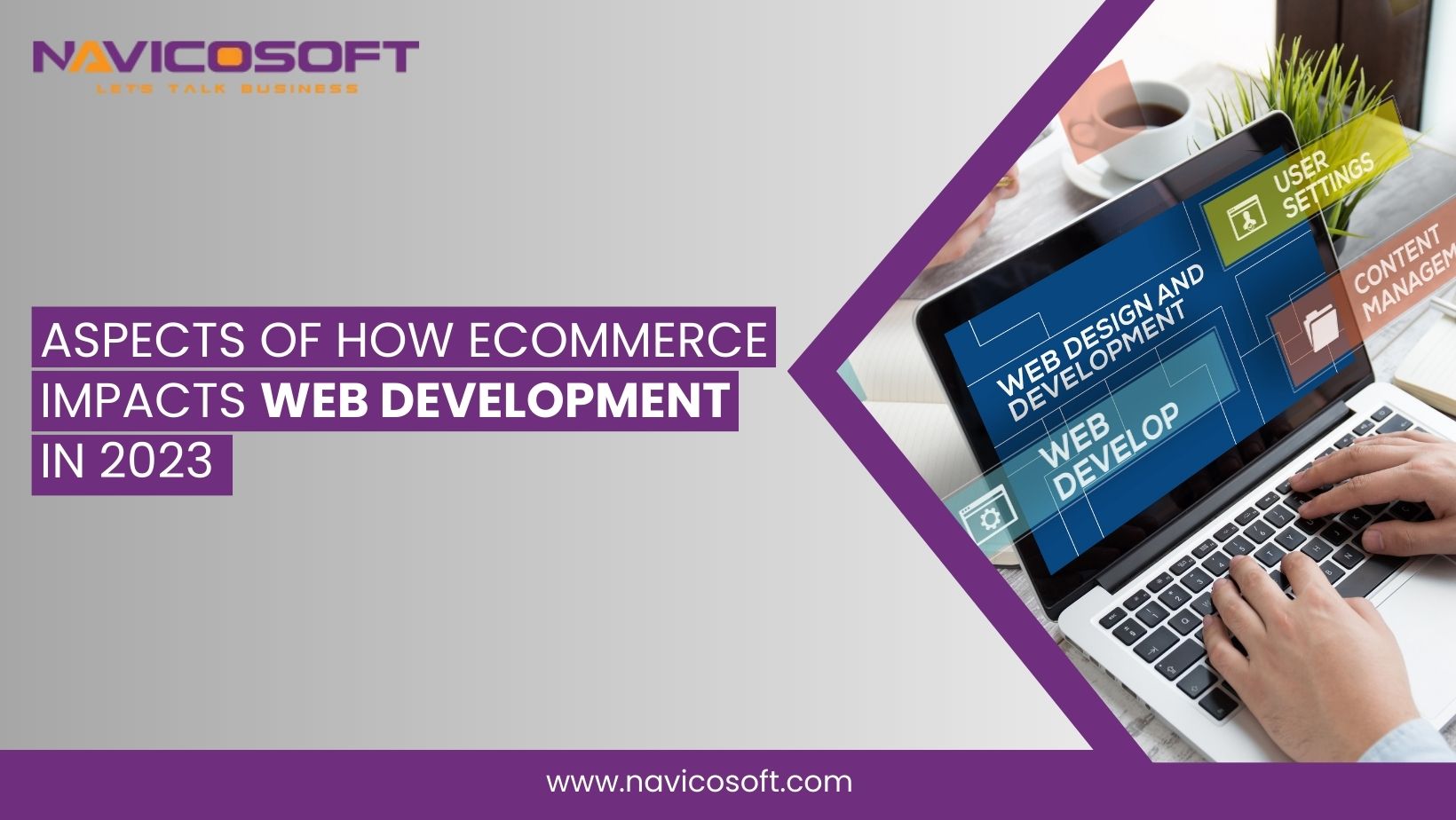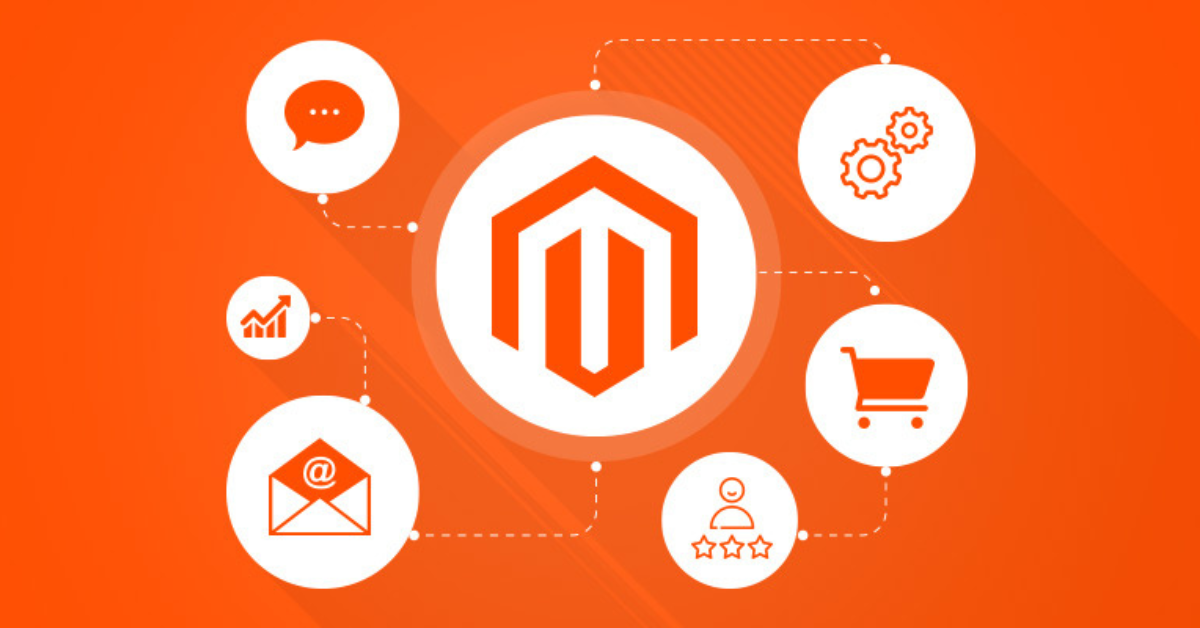The future of e-commerce in 2023 is poised for remarkable advancements. This blog dedicates to understanding how ecommerce impacts web development in the current era. From personalized experiences driven by AI to integrating voice commerce and AR technology, e-commerce businesses are on a trajectory to provide unparalleled customer experiences. Therefore, embracing innovation and sustainability will be key to staying ahead in this rapidly evolving digital landscape.
Whereas, in the context of web development, e-commerce involves creating and maintaining online platforms. Here is where businesses can showcase their products or services, and customers can browse, select, and make purchases electronically. Effective e-commerce web development includes designing user-friendly interfaces and ensuring mobile responsiveness. In addition, it also comprises integrating secure payment gateways and optimizing websites for search engines. So businesses are more drawn towards having an ecommerce website development service on board. Hence, implementing features that enhance the overall shopping experience for customers.
However, before moving forward to learn how ecommerce impacts web development, let’s have a brief look at:
Key trends that will shape e-commerce in 2023
Personalization at Scale
In 2023, personalization will reach new heights. E-commerce platforms will leverage artificial intelligence and machine learning to deliver hyper-personalized product recommendations. Not only that, but also the tailored content and targeted marketing campaigns and enhancing customer engagement and loyalty.
Voice Commerce Revolution
Voice assistants like Alexa and Google Assistant will play a significant role in e-commerce. With voice commerce becoming mainstream, customers can place orders, make inquiries, and receive personalized recommendations through voice commands.
Augmented Reality Shopping
Augmented reality (AR) will revolutionize the way customers shop online. By integrating AR technology into their websites and apps, e-commerce businesses can offer virtual try-on experiences for clothing and accessories, enhancing customer confidence in their purchase decisions.
Sustainable and Ethical Practices
In 2023, sustainability and ethical practices will be at the forefront of e-commerce. Customers will gravitate towards eco-friendly and socially responsible brands, prompting businesses to adopt sustainable supply chain practices and transparent sourcing.
Now let’s move forward to:
How ecommerce impacts web development?
User Interface and User Experience
Creating an intuitive, user-friendly interface is essential in e-commerce web development. Developers focus on designing layouts, navigation, and checkout processes that enhance the overall user experience, ultimately leading to higher conversions. In the dynamic landscape of e-commerce, success hinges on more than just offering great products or competitive prices. User Interface (UI) and User Experience (UX) have emerged as critical factors that can make or break an e-commerce venture. In this article, let’s explore the pivotal role of UI and UX in e-commerce and how they boost conversions, increase customer loyalty, and drive online success.
Understanding User Interface (UI) in E-commerce
User Interface, in the context of e-commerce, directs to the visual design and layout of a website that users interact with. It encompasses everything from the colors, typography, and imagery to the placement of buttons, menus, and product listings. A well-crafted UI can instantly connect with visitors, creating a positive user experience.
The Importance of User Experience (UX) in E-commerce
User Experience goes beyond the visual aesthetics and delves into the overall feeling and satisfaction users experience while navigating an e-commerce website. UX considers factors like ease of use, site speed, responsiveness, and overall accessibility. A seamless UX guides users through their journey, ensuring they find what they need easily and delightfully.
First Impressions Matter
In the current fast-paced world of online shopping, first impressions matter significantly. Studies show that users form their opinion about a website within a few seconds of landing on it. An appealing and intuitive UI catches users’ attention, encouraging them to explore further. Meanwhile, a positive UX keeps them engaged, leading to higher conversions and reduced bounce rates.
Mobile Responsiveness
With the rise of mobile commerce, mobile responsiveness has become paramount. A mobile-friendly UI and UX enable seamless shopping experiences on various devices, from smartphones to tablets. E-commerce businesses prioritizing mobile responsiveness witness higher engagement and conversions, as customers can shop on the go.
Simplifying Navigation and Search
A cluttered or confusing navigation can frustrate users and drive them away. Therefore, web developers and designers must prioritize a clear and intuitive navigation system. That can help users find products effortlessly.
In addition, a powerful search functionality that delivers accurate results promptly improves the user experience and drives conversions.
Visual Storytelling and Product Presentation
In e-commerce, product presentation is everything. A well-designed UI allows for compelling visual storytelling, with high-quality images/ videos to showcase products in their best light. A user-friendly zoom feature and 360-degree product views further enhance the shopping experience, increasing confidence in purchase decisions.
In the fast-evolving world of e-commerce, User Interface (UI) and User Experience (UX) have emerged as indispensable components of a successful online business. From captivating visitors with a visually appealing UI to guiding them seamlessly through a positive UX, e-commerce businesses can boost conversions, increase customer loyalty, and drive online success. Prioritizing mobile responsiveness, simplifying navigation, and personalizing user experiences are just a few of the strategies that can set an e-commerce website apart from its competition. In conclusion, UI and UX are not mere buzzwords but powerful tools that can elevate e-commerce ventures to new heights in today’s digital marketplace.
Payment Gateway Integration
Another noticeable angle on how ecommerce impacts web development is the payment mode. Payment gateway integration has emerged as a vital aspect of ecommerce web development, enabling businesses to facilitate transactions and build customer trust.
Therefore, integrating secure payment gateways is crucial to ensure smooth and secure transactions on the e-commerce website. Web developers need to implement the necessary APIs and encryption protocols for secure payment processing.
Here let’s explore the pivotal role of payment gateway integration in e-commerce and its influence on secure transactions and enhanced customer experience.
Enabling Secure Transactions
Payment gateway integration is at the heart of secure online transactions in e-commerce. Also, it acts as the intermediary between the customer, the merchant, and the bank, securely facilitating payment information transfer. By encrypting sensitive financial data, payment gateways protect customers from potential data breaches and ensure that their personal information remains confidential.
Building Customer Trust and Confidence
Security is an immediate concern for online shoppers. Payment gateway integration instills confidence in customers, assuring them that their financial transactions are conducted in a safe environment. Displaying trust seals and ensuring compliance with industry security standards such as PCI DSS (Payment Card Industry Data Security Standard) further enhances customer trust and credibility, increasing conversions and reducing cart abandonment.
Streamlining the Checkout Process
The checkout process is a critical phase in e-commerce, where even minor friction can lead to cart abandonment. A seamless payment gateway integration simplifies the checkout process. That, as a result, allows customers to complete their purchases quickly and effortlessly. Web developers focus on creating an intuitive and user-friendly interface, reducing the number of steps required for payment, and offering multiple payment options to cater to diverse customer preferences.
Catering to Global Customers
For e-commerce businesses with a global reach, payment gateway integration becomes even more crucial. Different regions have varying payment preferences and methods. A well-integrated payment gateway supports multiple currencies and payment methods, ensuring that customers worldwide can purchase their local currency without facing any hindrances.
Handling Subscription and Recurring Payments
Many e-commerce businesses offer subscription-based services or products with recurring billing cycles. Payment gateway integration enables businesses to handle recurring payments seamlessly. By automating the billing process, businesses can maintain a steady stream of revenue while customers benefit from a hassle-free payment experience.
Payment gateway integration holds a crucial role in the success of e-commerce ventures. By providing a secure and seamless online payment experience, businesses can build customer trust and enhance the overall shopping experience. Moreover, payment gateway integration acts as a shield against payment fraud and provides valuable transaction insights, allowing businesses to make informed decisions. As e-commerce continues to evolve, payment gateway integration remains an essential aspect of web development. Besides that, it contributes to the growth and success of online businesses.
Conclusion!
In the end, clearly, how ecommerce impacts web development is significant by demanding specialized features and functionalities catering to the unique requirements of online businesses. As technology continues to advance rapidly, the e-commerce landscape in 2023 is set to witness groundbreaking changes.
However, web developers play a critical role in ensuring that e-commerce websites are secure, user-friendly, and capable of driving conversions and business growth. Nevertheless, professional ecommerce website service is what the business can employ for the website with dream functionality.



